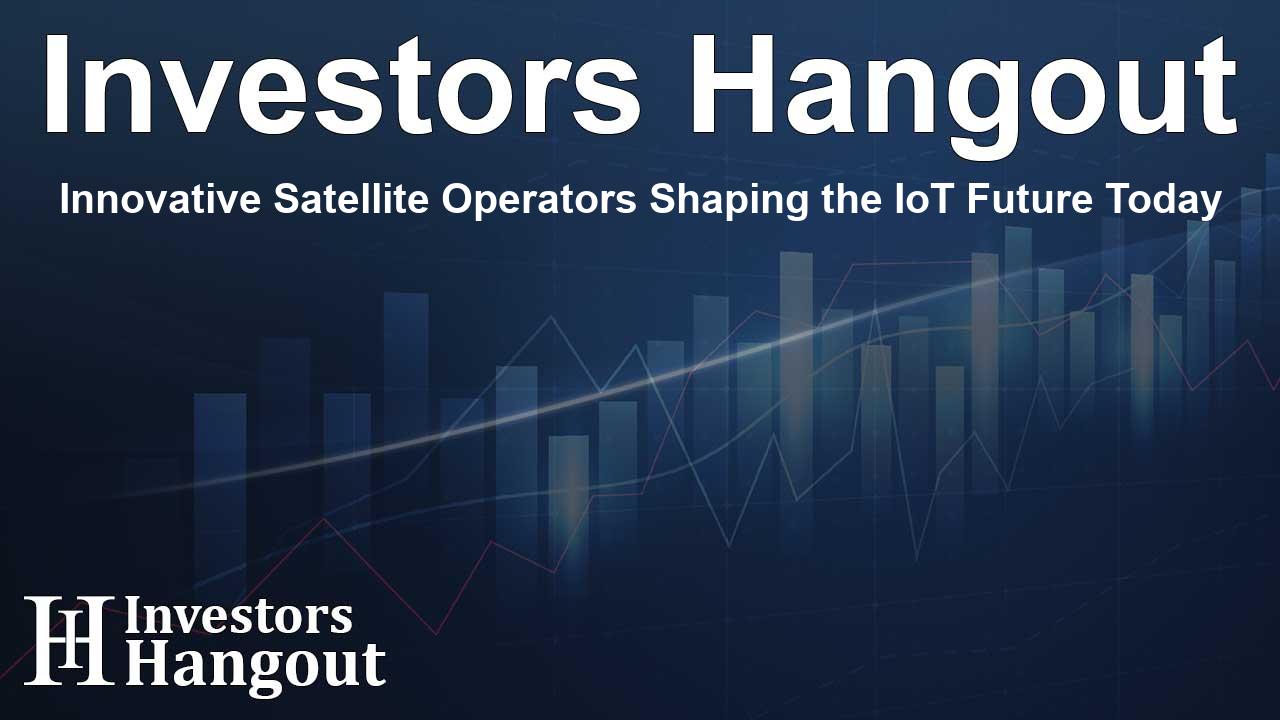Innovative Satellite Operators Shaping the IoT Future Today

Transformative Innovations among Satellite Operators in the IoT Space
In the rapidly evolving realm of technology, the contribution of satellite operators to the Internet of Things (IoT) market is becoming increasingly pivotal. Recently, a prominent technology intelligence firm recognized several operators for their significant innovations, underscoring their role in expanding the satellite IoT ecosystem. These operators have adeptly introduced new technologies and services that appeal to organizations looking to enhance their operational capabilities beyond terrestrial constraints.
Emerging Players Lead the Charge
A notable player in this landscape is Globalstar, a company that has made a name for itself by providing affordable IoT services. Historically, Globalstar excelled in one-way messaging markets, particularly within asset tracking sectors. This specialization has allowed them to develop low-cost, low-data communication solutions that are highly valuable to customers. Their strategy includes launching a two-way messaging service, which represents an expansion of their offerings in the IoT domain. Furthermore, Globalstar's integration of LTE and 5G terrestrial spectrum enables them to deliver comprehensive connectivity solutions, setting them apart from competitors.
Innovations from Industry Leaders
Following closely behind is Iridium, another influential operator acknowledged for its innovative approach to IoT. With a focus on multi-mode capabilities, Iridium has announced its 3GPP NTN service. This new service has the potential to significantly disrupt the satellite IoT market, creating new competitive dynamics among operators. Their commitment to innovation exemplifies how established companies can adapt to emerging technological standards and customer demands.
Building Bridges with Partnerships
Meanwhile, newer companies like Sateliot and OQ Technology have emerged as key players in the adoption of 3GPP NTN technology. Despite being relatively new in the field, these operators are assembling low Earth orbit (LEO) constellations that adhere to the new standards, enhancing their operational capabilities. Collaborations with mobile network operators and mobile virtual network operators are vital for their growth, enabling them to ramp up their services as their satellite infrastructures become more robust.
Utilizing NTN and LoRa Technology
The burgeoning usage of the LoRa NTN standard also plays a critical role in the integration of satellites into the IoT ecosystem. This technology aligns well with the cost and power limitations often faced by IoT deployments. Among the recognized innovators, Lacuna Space and EchoStar Mobile are pioneering the implementation of this standard. Each company is charting its path, with EchoStar Mobile honing in on its LoRa NTN solutions across Europe, while Lacuna Space focuses on broader market expansion.
A Competitive Landscape
Starlink, a formidable name in the satellite IoT landscape, is poised to launch an IoT service in the coming years. The massive constellation of LEO satellites, consisting of thousands of operational satellites, positions Starlink as a major player. However, as Amazon ventures into this space with its Project Kuiper initiative, competition is expected to intensify. Amazon is equally committed to leveraging its satellite capabilities for varied applications that span IoT devices and broadband services.
According to industry experts, the success of satellite operators within the IoT market hinges on an array of factors, including the size of their satellite constellations, orbital positions, and compatibility with established protocols. Each operator featured in this evaluation demonstrates a clear understanding of the unique challenges presented by the IoT landscape, prioritizing strategies that attract more users to satellite technology.
Conclusion: The Future of Satellite IoT
The consistent advancements made by these operators suggest a bright future for the satellite IoT market. As ABI Research highlights in its recent report, these innovations are crucial for driving the growth and acceptance of satellite IoT solutions among businesses and organizations worldwide.
Frequently Asked Questions
What are the key factors driving innovation among satellite operators?
The success of satellite operators in the IoT market is influenced by the size of their constellations, orbital regimes, and compatibility with IoT protocols.
What role does Globalstar play in the satellite IoT market?
Globalstar is recognized for its affordable IoT services, specializing in low-cost, low-data communications particularly in asset tracking.
How does Iridium differentiate itself in this industry?
Iridium's focus on multi-mode capabilities and its unique 3GPP NTN service set it apart as a leader in innovation.
What is the significance of LoRa NTN technology?
LoRa NTN technology meets the cost and power constraints essential for IoT applications, making it crucial for satellite integration.
What are the implications of competition from companies like Amazon?
Amazon's entry into the satellite IoT market with Project Kuiper could heighten competition, challenging existing operators to enhance their offerings.
About The Author
Contact Dominic Sanders privately here. Or send an email with ATTN: Dominic Sanders as the subject to contact@investorshangout.com.
About Investors Hangout
Investors Hangout is a leading online stock forum for financial discussion and learning, offering a wide range of free tools and resources. It draws in traders of all levels, who exchange market knowledge, investigate trading tactics, and keep an eye on industry developments in real time. Featuring financial articles, stock message boards, quotes, charts, company profiles, and live news updates. Through cooperative learning and a wealth of informational resources, it helps users from novices creating their first portfolios to experts honing their techniques. Join Investors Hangout today: https://investorshangout.com/
The content of this article is based on factual, publicly available information and does not represent legal, financial, or investment advice. Investors Hangout does not offer financial advice, and the author is not a licensed financial advisor. Consult a qualified advisor before making any financial or investment decisions based on this article. This article should not be considered advice to purchase, sell, or hold any securities or other investments. If any of the material provided here is inaccurate, please contact us for corrections.
